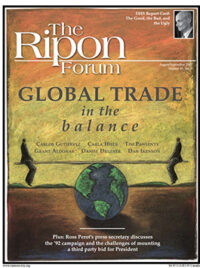
Over the past 60 years, under Republicans and Democrats alike, the United States has worked to open global markets and expand trade opportunities. Our trade policy has hugely benefited our businesses, farmers, consumers, and our national economy.
The Peterson Institute for International Economics calculates that the United States is richer by $1 trillion per year as a result of opening markets since World War II. That translates into $9,000 of added wealth per year for the average U.S. household.
Poor countries that opened their markets to trade and investment on average have grown five times faster than those that kept their markets closed, resulting in expanded market opportunities for our producers, farmers, and service providers. Workers in export-related industries have gained too, for those jobs pay higher wages, provide greater benefits, and offer more security than jobs in the overall economy. Consumers have also gained from access to higher quality and lower costing products.
Our trade policy has hugely benefited our business, farmers, consumers, abd out national economy.
But what about the future? The World Trade Organization’s Doha Round of multilateral trade negotiations is in deep trouble. The 150 governments involved cannot agree on how to reduce farm subsidies, lower tariffs, remove trade barriers on highly protected industrial and agricultural products, open services markets, or promote development.
Here at home, prospects for trade policy are, if anything, even bleaker. Despite the much heralded announcement in May of a new bipartisan consensus on trade among Democrats and Republicans in Congress and the Administration, House Democrats have largely walked away from that agreement, announcing they will not support the already negotiated free trade agreements with Colombia and South Korea which would offer substantial benefits to our economy. They will not consider voting on our trade agreements signed with Peru and Panama, which slash trade barriers faced by our producers, unless those countries enact changes in their labor and environmental laws dictated by our Congress.
To compound the difficulties, the Congressional leadership has announced that it sees no need to renew the President’s Trade Promotion Authority (TPA), under which the President negotiates trade agreements. Without TPA, it is virtually impossible for the United States to negotiate effectively with our trading partners, for we can give no assurance that what the Trade Representative negotiates will be the final deal voted on by Congress. In short, we are dealing ourselves out of negotiations that open markets.
If the rest of the world were to declare a standstill on trade, we might say circumstances will not worsen for our exporters. But, alas, other countries are racing ahead to negotiate new trade agreements. As they obtain access to key global markets, we will be left behind, and our exporters and their workers will almost certainly be disadvantaged by our lack of an effective trade policy.
How might we resurrect trade policy? First, we need to educate our citizens about the benefits of trade. We can agree with anti-globalists that trade liberalization is not a panacea for the world’s ills. Yet it is indisputable that trade stimulates economic growth and helps create the resources required to deal with pressing social problems. And adherence to the rules of a broad trade agreement encourages rule of law, transparency, and respect for property, which are critical elements to stability. The facts about trade need to get out.
For example, few Americans know that lowering trade barriers even by one-third in the Doha Round would boost the average American’s annual income by $2,000 (in 2003 dollars). They have no idea that poor countries are made less competitive because they are required to pay higher tariffs on their exports than wealthy countries and would be astonished to learn that the U.S. collects roughly the same amount of tariffs from Bangladesh on $2 billion in imports that it does from France on $30 billion. They do not know of the huge subsidies that wealthy governments, including our own, pay their farmers that force more efficient producers in poor countries out of the market, or that 80 percent of subsidies the United States pays its farmers go to large agribusinesses, not to small family farmers. Significantly, Americans do not know that these are issues at stake in the Doha Round.
By explaining these facts, our business and political leaders could help our citizens understand that trade is the best tool our government has to generate economic growth at home and abroad, alleviate poverty, correct inequities in our trade regime, and encourage global stability. If every CEO in the United States would give the same effort to educating his or her employees regarding the benefits of trade as he or she does to enhancing company productivity, political support for open trade and the Doha Round would soar.
Second, we need to help those adversely affected by change. Not every citizen benefits from trade. We need to do a much better job assisting those displaced by changes in the workplace, whether those changes are caused by trade, technology, or shifts in consumer demand. Studies show that while U.S. gains from trade are $1 trillion per year, the lifetime costs of worker displacement are roughly $50 billion per year. To gain adherents for our efforts to open markets, we need to do a better job to help those left out – not by closing down trade – but rather by allocating some of the very substantial yearly gains we derive from trade to help those displaced because of change driven by globalization and technology.
If every CEO in the Untied States would give the same effort to educating the benefits of trade as he or she does to enhancing company productivity, political support for open trade and the Doha Round would soar.
Current programs such as unemployment insurance and trade adjustment assistance are not tailored for the 21st century economy epitomized by rapid change. It is time we looked at a program that combines unemployment insurance with a form of wage insurance for workers who take a new job at a lower salary. Assistance that brought their pay for a transitional period closer to what they previously earned would provide incentive to find a new job quickly and in a new field, even where as an entry-level worker the new job paid less than the job closed down. Such a program would encourage workers to stay in the workforce and obtain the most effective training possible, which is training on the job. We also need to ensure workers have access to health insurance and pension portability. This will cost some money. But our economy derives huge gains from trade, and it is in our national interest to allocate some of those gains to help those who bear the burden of change. To do otherwise risks losing public support for trade.
Third, we need to help Americans compete effectively in the global market. We need to do a better job of training and educating our workforce to compete in the rapidly-changing global market. That requires investing more of the wealth that our nation derives from open markets in our human capital. For example, we cannot continue to be the world’s most innovative nation with the richest economy while one third of our high school students fail to graduate. Similarly, in this age of globalization, we cannot afford to have our citizens be deficient in foreign languages or have our capital infrastructure – from our electricity grids to our highways and bridges – be in a state of disrepair. All of this impedes our competitiveness. Lack of attention to and failure to invest in our nation’s future needs, not trade, are real sources of concern.
To reap the benefits of trade that benefit U.S. businesses, workers, and farmers, we must promote sound policy here at home.
Carla A. Hills served as U.S. Trade Representative from 1989 to 1993. She is currently Chairman and Chief Executive Officer of Hills & Company, an international consulting firm based in Washington, DC.




